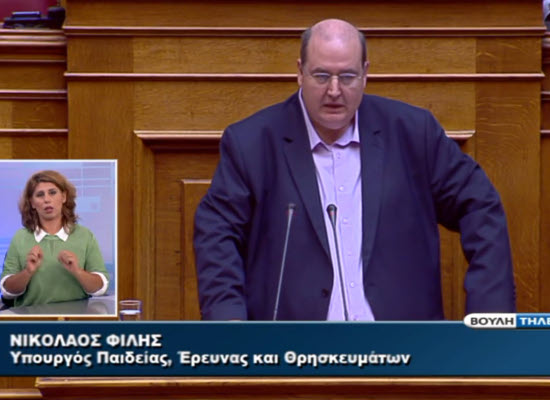
28-09-16 Education Minister defends recent reforms in parliamentary debate
Education Minister Nikos Filis defended the recent educational reforms passed in a plenary session parliamentary debate on education.
Filis noted that these reforms are crucial for Greece to transcend the economic crisis and cited the timely opening of schools as a signal of the start of a return to normalcy after many years. About 24 million textbooks had been received by schools before the first day, and 12,000 substitute teachers were hired as of September 24 to fill vacancies, through the supreme state hiring council. In 2012, only 1,431 teachers had been hired by the same date. The ministry has secured funding to hire a total of 21,000 substitutes, with all vacancies to be covered within 15 days.
Filis said that the hiring of special education teachers was made a priority, and 538 new induction classes were established this year in primary and secondary schools, while 23 new special education schools were created.
Filis submitted a table showing hirings at various levels to be between 34% and 700% than in the prior six years of bailout memorandums.
750 school libraries that closed under Pasok and ND governments are re-opening
Filis said that in 2011 students were handed photocopies instead of books, when there were thousands of teaching vacancies and hundreds of schools were merged. He said that under then interior minister Kyriakos Mitsotakis put 2,500 teachers on ice, a first move toward redundancy, thus shutting down vocational high schools and favouring private IEK vocational schools.
In September 2014, the then education minister has asked retired teachers to work on a volunteer basis to cover vacancies, Filis noted, highlighting the crucial improvements this year.
The aim is a school of quality and equality, the minister underlined, noting the contribution of the National Dialogue on Education, in which politicians, teachers and technocrats participated with proposals on primary, secondary, general technical and tertiary education. He tabled the committee’s report.
Filis said the recent reforms will help to utilise the pivotal role of education in national reconstruction.
Three-pronged reform over a three-year period
- Ten-year mandatory education and reform of junior high schools, abolishing the examinations overload. Group cooperation and experiential teaching will be stressed. Professor Gerasimos Kouzelis of the Institute of Educational Policy is coordinating the project.
- Abolition of nationwide Panelladikes exams for university admission, along with a revamped last two years of high school and university reform. Junior high school will focus on breadth of learning and high school on in-depth knowledge of subject areas.
“This parliament can and should agree on a new university admissions system with broad consensus, because changes in the educational system and admissions is not a four-year matter,” Filis said, asking parliament’s education committee to use the national dialogue on education report to advance the necessary reforms.
- Unified field of Research and Education
The aim is to redefine relations between universities, tertiary technical schools and research centres, ensuring their viability. An upgraded institution to evaluate all three will be central.
Private universities
Filis rejected the argument that private universities will help improve state universities and create a market of educational opportunity. He said private universities are not part of European educational culture, where state universities with mixed funding systems are at a much higher level, and that graduates of Greek universities are awarded a high percentage of scholarships at European and US universities.
“Ladies and gentlemen of New Democracy, stop degrading and slandering state universities, depicting them as an arena of violence and lawlessness,” Filis underlined.
Efforts to bolster state universities include scholarship, post-doctoral stipends and new teaching posts
Three-year plan-creditors-OECD
Filis said that the government and the Organisation For Economic Cooperation and development renegotiated a plan for new policies and priorities. He said a 2011 report relied on pre-crisis data and involved neo-liberal choices of previous governments. He said the three-year plan will gradually be combined with the withdrawal of creditors’ oversight, as educational policy is under EU law an affair of national policy.
Tenured teachers’ appointments planned with increased education spending.
Filis said the government has submitted to Greece’s lenders a comprehensive study showing the need for 20,000 appointments in the next three years, beginning next year, with a new system of appointments. Already 470 teachers who qualified for appointment in a 2008 exam will be posted now.
A gradual increase of public education spending is necessary for Greece to converge with the European average, the minister said, noting that this government halted a gradual decline at the current 2.8 percent of GDP, whereas the Samaras-Venizelos government had planned a further drop to 1.9 percent of GDP.
Filis said that punitive teacher evaluations were stopped and that suspended teachers had returned to work, teachers were allowed to help choose principals, and teacher re-training was re-introduced on subject areas and teaching methods.
Refugee Education
The minister stressed that each child that resides in our country has a right to education and that society has embraced refugees. On 10 October, an educational programme will be launched for 2,000 students from seven refugee reception centres at neighbouring schools in Attica, Macedonia, and Epirus.
Religious education courses
Filis said the new comparative religion classes in primary and secondary schools that will highlight Eastern Orthodox traditions does not involve a church-state clash. He said the curriculum was drafted by an Institute of Educational Policy Committee with the participation of distinguished theologians and has been taught for the last three years on a pilot programme basis.
“Religion, from a confessional lesson will become a course of knowledge of religions, and of course with a priority given to knowledge of Orthodox civilization.
The pilot programme will be implemented nationwide this year and will be evaluated by the Institute of Educational Policy, so that new textbooks may be issued next year.
“The state is responsible for education. Schools are secular, with religious freedom and neutral toward religion,” Filis said.
